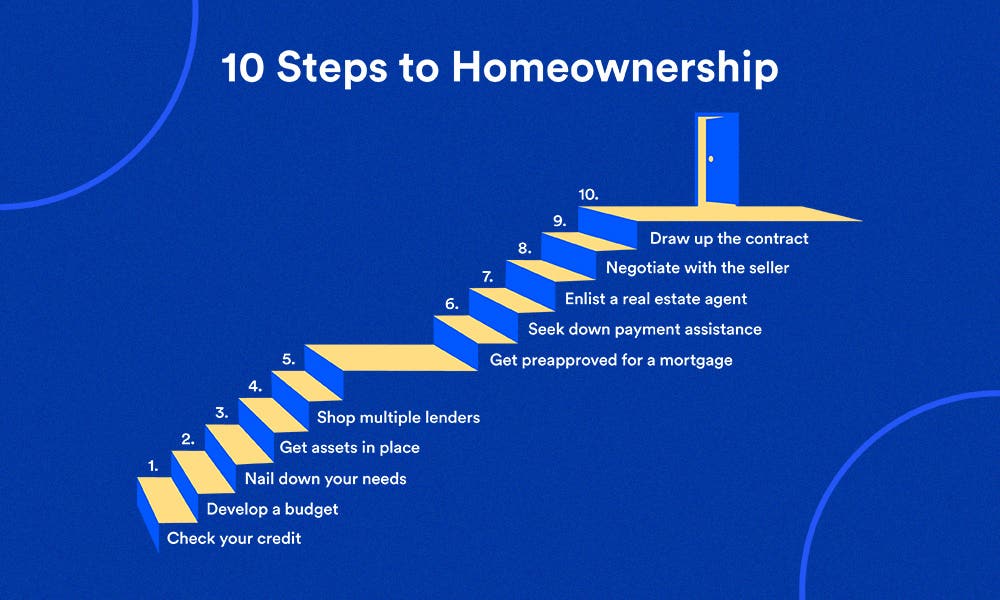1. Save for a down payment early.
Get pre-approved for a mortgage. Buying a home can be an exciting yet daunting experience, especially for first-time buyers. Proper preparation and understanding of the process can make a significant difference. Start by saving for a down payment as early as possible, which can greatly impact your mortgage options.
It’s also crucial to get pre-approved for a mortgage to know your budget and streamline the home-buying process. Research various neighborhoods to find the best fit for your lifestyle and needs. Always work with a reputable real estate agent who can guide you through each step. Lastly, don’t forget to account for additional costs like closing fees and home inspections. These tips will help ensure a smoother and more confident home-buying journey.
Starting Your Journey: Essential First Steps
Buying your first home is exciting yet challenging. You need proper guidance. These initial steps can help you start on the right path.
Setting Realistic Goals
Begin by setting realistic goals for your home purchase. Think about your needs and wants in a home. List them out.
- How many bedrooms do you need?
- Do you prefer a house or an apartment?
- What neighborhoods do you like?
Setting clear goals helps you focus on what matters most.
Understanding Your Budget
Knowing your budget is crucial. Calculate your monthly income and expenses. Use this information to see how much you can afford for a home.
Here is a simple table to guide you:
| Category | Amount |
|---|---|
| Monthly Income | $5,000 |
| Monthly Expenses | $3,000 |
| Available for Home | $2,000 |
Use the available amount to plan your budget wisely.

Credit: nfmlending.com
Navigating The World Of Mortgages
Buying your first home is exciting but can be overwhelming. One of the most crucial steps is understanding mortgages. This section will help you navigate the world of mortgages with ease.
Types Of Mortgages
There are many types of mortgages available. Understanding them helps you make the right choice.
- Fixed-Rate Mortgages: The interest rate stays the same throughout the loan term. This offers stability and predictable monthly payments.
- Adjustable-Rate Mortgages (ARMs): The interest rate changes periodically. Initial rates are usually lower than fixed-rate mortgages but can increase over time.
- FHA Loans: These are backed by the Federal Housing Administration. They offer lower down payments and are easier to qualify for.
- VA Loans: Available to veterans and active military members. These loans often require no down payment.
- USDA Loans: For rural property buyers, these loans offer low-interest rates and no down payment.
Securing The Best Rates
Getting the best mortgage rate can save you a lot of money. Follow these tips to secure the best rates.
- Improve Your Credit Score: A higher credit score can lead to lower interest rates. Pay your bills on time and reduce your debt.
- Save for a Larger Down Payment: A larger down payment can reduce your mortgage rate. Aim for at least 20% of the home’s price.
- Compare Multiple Lenders: Don’t settle for the first lender you find. Get quotes from at least three different lenders.
- Lock in Your Rate: Mortgage rates can change quickly. Once you find a good rate, lock it in to prevent changes.
- Consider Points: Paying points can lower your interest rate. One point equals 1% of the loan amount.
Understanding and securing the best mortgage is crucial. These tips will help you make informed decisions and save money in the long run.
The Importance Of Location
Buying your first home is an exciting journey. One of the most critical factors is the location. Location impacts your daily life, convenience, and home value. Let’s explore why location is so important for first-time home buyers.
Researching Neighborhoods
Start by researching neighborhoods that interest you. Look into the amenities available nearby. Make a list of schools, parks, and grocery stores. Check the crime rates and overall safety. Visit the area at different times of the day. This will give you a feel of the neighborhood. Ask locals about their experiences and opinions.
Considering Future Value
Think about the future value of the location. Is the area growing or declining? Look at recent property price trends. High growth areas may offer better returns. Consult with a real estate expert. They can provide insights on future developments. Consider the proximity to public transport and major highways. These factors can increase property value.
| Factor | Why It Matters |
|---|---|
| Proximity to Schools | Good schools can boost home value. |
| Crime Rates | Low crime rates ensure safety and peace of mind. |
| Public Transport | Easy access increases convenience and value. |
| Amenities | Nearby amenities enhance your lifestyle. |
- Visit the neighborhood multiple times.
- Talk to local residents.
- Check crime rates and school quality.
- Consult with real estate experts.
- Consider future developments and growth.

Credit: www.bankrate.com
Mastering The Art Of House Hunting
House hunting can be exciting and overwhelming for first-time home buyers. Knowing what you want, utilizing tools, and seeking expert help can make the process smoother. Here are some tips to help you master the art of house hunting.
Creating A Must-have List
Start by creating a must-have list. This list should include features that are essential for your new home.
- Number of bedrooms and bathrooms
- Type of kitchen
- Yard size
- Proximity to schools and work
Having a clear list helps narrow down your choices. You can compare homes more effectively. This way, you won’t waste time on homes that don’t meet your needs.
Utilizing Technology And Real Estate Agents
Technology and real estate agents are your best friends in house hunting.
| Tool | Benefits |
|---|---|
| Real estate websites | Access to many listings, photos, and virtual tours |
| Mobile apps | Search homes on the go |
| Real estate agents | Expert advice, market knowledge, and negotiation skills |
Real estate websites provide a plethora of listings. You can view photos and take virtual tours. Mobile apps allow you to search homes while on the move.
Real estate agents offer expert advice. They have market knowledge and negotiation skills. Their expertise can guide you through the process.
Financial Preparation
Buying your first home is exciting. Proper financial preparation can make it easier. This section covers saving for a down payment and exploring assistance programs.
Saving For A Down Payment
Start by setting a realistic goal for your down payment. Typically, aim for 20% of the home’s price. This helps avoid private mortgage insurance (PMI).
Use a high-yield savings account for your down payment. This can earn you more interest than a regular savings account.
Reduce your expenses to save more. Make a budget and stick to it. Track every dollar you spend. Cut unnecessary costs.
Automate your savings. Set up automatic transfers to your savings account. This makes saving effortless.
Consider side jobs for extra income. Freelancing, gig work, or part-time jobs can boost your savings.
Exploring Assistance Programs
Research down payment assistance programs. Many states offer help for first-time home buyers. Check your local government’s website for details.
Look into federal programs like FHA loans. These have lower down payment requirements. They are designed for first-time buyers.
Explore grants and forgivable loans. Some programs offer money you don’t have to repay. These can reduce your financial burden.
Consult a housing counselor. They can provide personalized advice on available programs. They also help with the application process.
Join home buyer education classes. These often provide information on assistance programs. They can also teach you about the buying process.

Credit: smarttravelpco4.rs
Closing The Deal
Buying your first home is an exciting journey. The final step is closing the deal. This stage involves signing important documents and making payments. It’s crucial to understand every aspect to avoid surprises. Let’s dive into some essential tips.
Understanding Closing Costs
Closing costs are fees paid at the end of a real estate transaction. They can include:
- Loan origination fees
- Appraisal fees
- Title insurance
- Attorney fees
- Home inspection fees
These costs typically range from 2% to 5% of the home’s purchase price. Here’s a breakdown of common closing costs:
| Type of Fee | Estimated Cost |
|---|---|
| Loan Origination Fee | 1% of loan amount |
| Appraisal Fee | $300 – $500 |
| Title Insurance | $500 – $1,000 |
| Attorney Fees | $500 – $1,500 |
| Home Inspection | $200 – $500 |
Make sure to review these costs with your lender. Ask questions if anything is unclear.
Final Walk-through Tips
The final walk-through is your last chance to inspect the home. Here are some tips:
- Check that all agreed-upon repairs are complete.
- Ensure all appliances are working.
- Test lights, faucets, and toilets.
- Look for any new damage to walls or floors.
- Verify that the seller has removed all belongings.
Bring a checklist to ensure you don’t miss anything. Take your time during the walk-through. It’s your future home, so be thorough.
Frequently Asked Questions
What Are The First Steps To Buying A Home?
Start by assessing your financial situation and getting pre-approved for a mortgage.
How Much Should I Save For A Down Payment?
Aim to save at least 20% of the home’s purchase price to avoid private mortgage insurance.
What Should I Look For In A Neighborhood?
Consider safety, amenities, school quality, and commute times when evaluating neighborhoods.
How Do I Choose A Real Estate Agent?
Look for an experienced, local agent with good reviews and a strong track record.
What Should I Know Before Making An Offer?
Understand the market conditions, property value, and potential repair costs before submitting your offer.
How Can I Avoid Buyer’s Remorse?
Research thoroughly, consult experts, and ensure the home meets your long-term needs and lifestyle.
Conclusion
Navigating the home-buying process can be challenging. These tips simplify the journey for first-time buyers. Remember to research, plan, and consult professionals. Each step brings you closer to your dream home. Stay patient and informed, and soon you’ll have the keys to your new home.
Happy house hunting!

